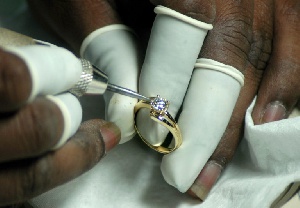Government’s fight against illegal mining has cut out supply to local jewellers whose main source of raw material is small-scale miners, pushing some to the brink of collapse.
If government can help them find other sources of supply – since no one sets eyes on gold produced by large-scale multinationals – they would be grateful, Ernestina Agyapong, Chairperson of the Federation of Ashanti Regional Gold Smith and Jewellers, told the B&FT.
“Some of our members have shut down and moved into other ventures because of this situation. I know one of our members who is now a taxi-driver; another is now a beautician, and others have moved into brass works,” she said.
Also commenting on how the situation has impacted his business, Matthew Banahene, CEO of Atlanta City Jewellery, Kumasi, said he has been forced to move into using brass, which is not highly patronised because it’s inferior to gold.
“Because gold is not available, I had to move into using brass just to keep me in business. But the problem with brass is that it is not quality compared to gold. So, people do not like jewellery made of it. Sometimes jewellery I produce can be there for months, and no one will buy because it is not made of gold. People like gold because of its durability and other qualities,” he said.
According to Ernestina Agyapong, what has worsened the situation for the local jewellery industry is the influx of foreigners who are ready to pay more than the going price in order to get the gold – thereby crowding them out of business.
“We had people who usually supplied us with gold. but even with them the Indians have pre-financed them to supply them with gold. So, anytime they are able to get some of the gold, they rather supply to the Indians because the local producers don’t have money to pre-finance them — we only can pay on delivery.
“Another problem is that because the foreign jewellers have money, they are able to offer a higher price to the suppliers than the prevailing world market price for the gold. So, we are unable to compete with them, and this is really disturbing our business,” she said.
According to a global market research company, Euromonitor International, jewellery is the best-performing personal accessories category, with sales worth US$316billion in 2016. It is also the fastest-growing segment within the personal accessories industry, with 3 percent growth between 2015 and 2016.
Ghana exported an estimated US$4.43billion worth of gold in 2016.
The global jewellery industry is estimated to be worth some US$316billion.
Click to view details



Business News of Friday, 2 February 2018
Source: thebftonline.com

















